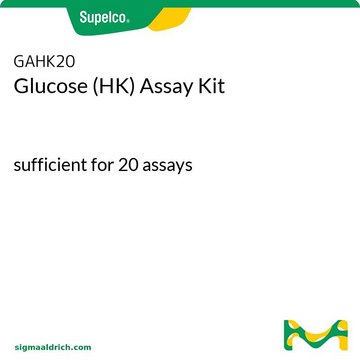MAK083
Glucose Uptake Colorimetric Assay Kit
sufficient for 100 colorimetric tests
Autenticatiper visualizzare i prezzi riservati alla tua organizzazione & contrattuali
About This Item
Codice UNSPSC:
12161503
NACRES:
NA.84
Prodotti consigliati
impiego
sufficient for 100 colorimetric tests
Metodo di rivelazione
colorimetric
Malattie correlate
endocrinological disorders, diabetes; cancer
Temperatura di conservazione
−20°C
Descrizione generale
Glucose is the primary source of energy for most cells. Glucose uptake into cells is highly regulated and the first rate limiting step in glucose metabolism. Glucose uptake is facilitated by the GLUT family of transporter proteins, whose expression and activity are regulated by multiple mechanisms. Glucose uptake is upregulated in many cancer cells, which exhibit high rates of aerobic glycolysis. Cells exhibiting insulin resistance show diminished glucose uptake in response to insulin stimulation.
The use of the recycling amplification reaction in the colorimetric assay results in the limit of detection being 10-fold lower (20-100 pmole) compared to the fluorescence assay (200-1,000 pmole, MAK084).
The use of the recycling amplification reaction in the colorimetric assay results in the limit of detection being 10-fold lower (20-100 pmole) compared to the fluorescence assay (200-1,000 pmole, MAK084).
Applicazioni
Glucose uptake colorimetric assay kit has been used to measure glucose uptake by a variety of cells.
Compatibilità
Suitable for detecting glucose uptake in adherent or suspension cells cultured in a 96-well microtiter plate.
Principio
The Glucose Uptake Colorimetric Assay kit provides a simple and direct procedure for measuring glucose uptake in a variety of cells. Glucose uptake is measured using the glucose analog, 2-deoxyglucose (2-DG), which is taken up by cells and phosphorylated by hexokinase to 2-DG6P. 2-DG6P cannot be further metabolized and accumulates in cells, directly proportional to the glucose uptake by cells. In this assay, 2-DG uptake is determined by a coupled enzymatic assay in which the 2-DG6P is oxidized, resulting in the generation of NADPH, which is then determined by a recycling amplification reaction in which the NADPH is utilized by glutathione reductase in a coupled enzymatic reaction that produces glutathione. Glutathione reacts with DTNB to product TNB, which is detected at 412 nm.
Prodotti correlati
N° Catalogo
Descrizione
Determinazione del prezzo
Sostituito da
N° Catalogo
Descrizione
Determinazione del prezzo
Certificati d'analisi (COA)
Cerca il Certificati d'analisi (COA) digitando il numero di lotto/batch corrispondente. I numeri di lotto o di batch sono stampati sull'etichetta dei prodotti dopo la parola ‘Lotto’ o ‘Batch’.
Possiedi già questo prodotto?
I documenti relativi ai prodotti acquistati recentemente sono disponibili nell’Archivio dei documenti.
Heng-Jing Hu et al.
Frontiers in pharmacology, 12, 690371-690371 (2021-12-25)
Atrial fibrosis is the basis for the occurrence and development of atrial fibrillation (AF) and is closely related to the Warburg effect, endoplasmic reticulum stress (ERS) and mitochondrion dysfunctions-induced cardiomyocyte apoptosis. Hydrogen sulfide (H2S) is a gaseous signalling molecule with
Yu-Yong Wang et al.
Disease markers, 2022, 9516774-9516774 (2022-05-17)
Prostate cancer (PCa) is one of the most common malignancies in men with high death rate worldwide. Paclitaxel (Taxol) is a widely used anticancer agent. Despite recent improvements in clinical application and research, development of drug resistance limits the efficacy
PLIN2 inhibits insulin-induced glucose uptake in myoblasts through the activation of the NLRP3 inflammasome.
Cho K A and Peter B K
International Journal of Molecular Medicine, 36(3), 839-844 (2015)
Méndez-Martínez Marisol et al.
Scientific reports, 9(1), 13372-13372 (2019-09-19)
Obesity is caused by lipid accumulation in adipose tissues inducing adipocyte dysfunction, characterized by insulin resistance, increased lipolysis, oxidative stress, and inflammation, leading to increased levels of adipokines. Herein the capacity of the subfractions (SFs) SF1, SF2, and SF3 from
MicroRNA-138 suppresses proliferation, invasion and glycolysis in malignant melanoma cells by targeting HIF-1α.
Chen Y, et al.
Experimental and Therapeutic Medicine, 11(6), 2513-2518 (2016)
Il team dei nostri ricercatori vanta grande esperienza in tutte le aree della ricerca quali Life Science, scienza dei materiali, sintesi chimica, cromatografia, discipline analitiche, ecc..
Contatta l'Assistenza Tecnica.

![2-Deoxy-2-[(7-nitro-2,1,3-benzoxadiazol-4-yl)amino]-D-glucose ≥97% (HPLC)](/deepweb/assets/sigmaaldrich/product/structures/104/527/40bd5a41-ebc4-484e-a10e-891fecfaea79/640/40bd5a41-ebc4-484e-a10e-891fecfaea79.png)



